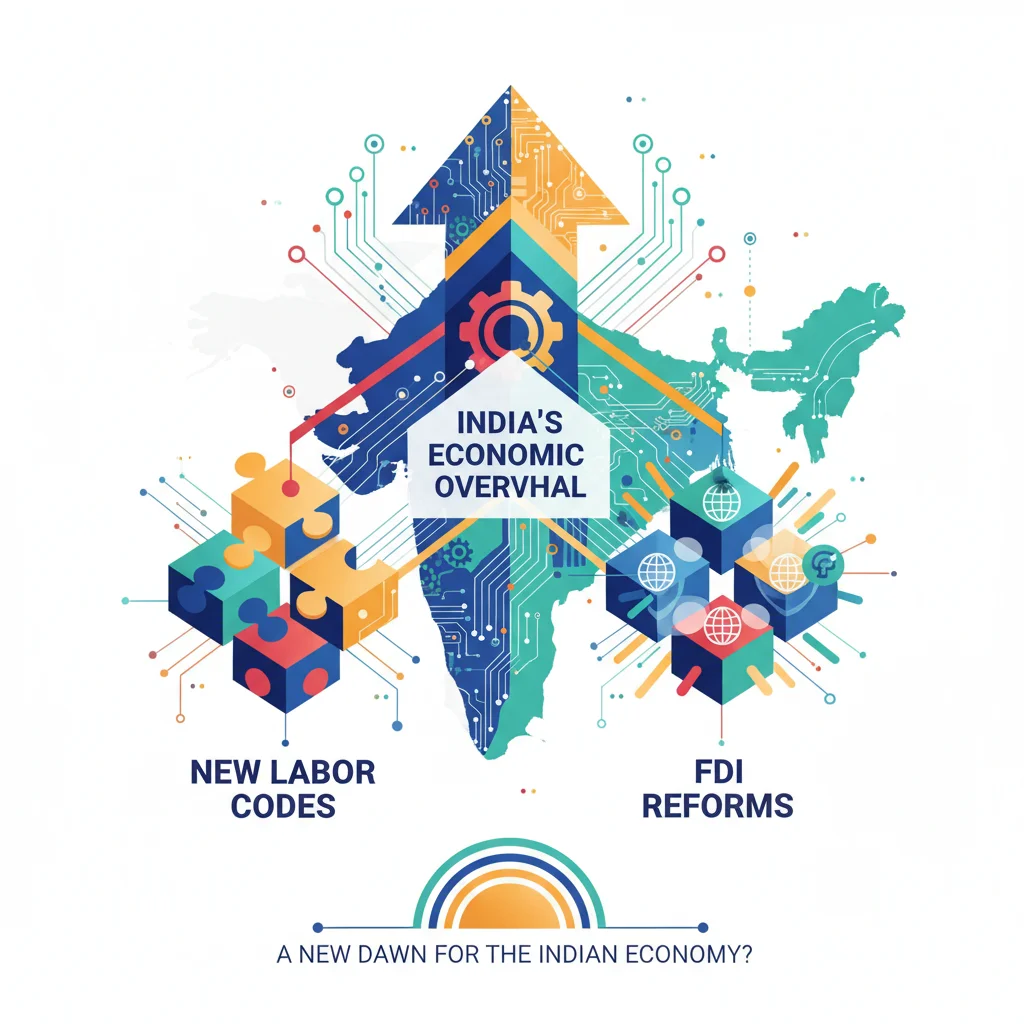
India’s Economic Overhaul: Unpacking the New Labor Codes and FDI Reforms for Global Investors
A New Dawn for the Indian Economy?
In the intricate world of global economics, few stories are as compelling as India’s ambitious journey toward becoming a manufacturing and financial powerhouse. For decades, investors and business leaders have watched the nation’s immense potential, often tempered by the complexities of its regulatory landscape. Now, a series of bold legislative moves are set to fundamentally reshape India’s economic architecture. The government has enacted a sweeping consolidation of its archaic labour laws and is signaling a major liberalization of its insurance sector, promising to unlock unprecedented opportunities while also presenting new challenges.
These are not minor tweaks; they represent a seismic shift in India’s approach to capital and labour, two fundamental pillars of any modern economy. By streamlining dozens of overlapping regulations and opening doors wider to foreign capital, India is sending a clear message to the world: it is serious about competing on the global stage. This post will delve deep into these transformative reforms, analyzing their potential impact on the Indian economy, the implications for domestic and international investing, and what they signify for the future of finance and business in the world’s largest democracy.
The Great Consolidation: Decoding India’s Four New Labour Codes
For years, India’s labour market was governed by a labyrinth of over two dozen central laws, some dating back to the colonial era. This complex web was often cited as a major impediment to growth, creating a high-friction environment for businesses and hindering formal job creation. In a landmark move, the Indian Parliament has consolidated 29 of these central laws into four comprehensive codes (source). The goal is simplification, modernization, and a significant boost to the country’s “Ease of Doing Business” ranking.
This restructuring aims to balance the welfare of workers with the flexibility demanded by a modern economy. Below is a breakdown of the four new codes and their primary functions:
| New Labour Code | Key Provisions and Impact |
|---|---|
| The Code on Wages, 2019 | Universalizes the right to a minimum wage and timely payment for all workers, regardless of sector or wage ceiling. Aims to reduce wage disparities and streamline compliance. |
| The Industrial Relations Code, 2020 | Arguably the most significant, this code raises the threshold for companies needing government permission for layoffs or closure from 100 to 300 employees. It also introduces provisions for fixed-term employment, offering businesses greater flexibility. |
| The Code on Social Security, 2020 | This code attempts to bring millions of gig and platform workers (e.g., ride-sharing drivers, delivery personnel) into the social safety net for the first time by creating a dedicated social security fund. |
| The Occupational Safety, Health and Working Conditions Code, 2020 | Consolidates 13 existing acts to create a single, comprehensive framework for workplace safety and health standards across various industries. |
For businesses, particularly in the manufacturing sector, these changes are monumental. The increased threshold for retrenchment in the Industrial Relations Code provides significant operational flexibility, potentially encouraging larger-scale investments and formal hiring. The formal recognition of fixed-term employment allows companies to adapt their workforce to fluctuating market demands without the long-term liabilities associated with permanent staff. This could be a game-changer for attracting foreign manufacturing giants looking to diversify their supply chains.
Opening the Floodgates: 100% FDI in the Insurance Sector
Concurrent with the labour reforms, the Indian government is making aggressive moves to liberalize its finance sector. A pivotal development is the plan to permit 100% foreign direct investment (FDI) in the insurance industry. This marks a significant departure from previous, more protectionist policies and is poised to inject a massive dose of capital, technology, and competition into the market.
Why is this so important? The Indian insurance market is vastly underpenetrated compared to global averages. Increased foreign participation is expected to have several profound effects:
- Capital Infusion: Global insurance giants bring deep pockets, providing the long-term capital necessary for insurers to expand their reach, underwrite larger risks, and invest in India’s burgeoning infrastructure needs.
- Technological Advancement: The influx of foreign players will accelerate the adoption of financial technology (fintech) and “Insurtech.” This means more sophisticated risk modeling, AI-driven customer service, and potentially the use of blockchain for transparent and efficient claims processing.
- Product Innovation: Increased competition will force domestic and foreign players alike to innovate, leading to a wider array of sophisticated insurance products for individuals and businesses, from complex corporate risk management to micro-insurance for the rural poor.
- Stock Market Impact: This policy shift could trigger a wave of mergers and acquisitions in the sector. It will also make Indian insurance stocks more attractive to global investors, potentially boosting valuations and driving activity on the stock market.
From an investing perspective, this opens up a high-growth sector that was previously difficult for foreign entities to fully control. The move signals a mature and confident approach to economic management, prioritizing growth and consumer benefit over protectionism. It’s a clear indicator that India’s banking and financial services ecosystem is on a path of rapid evolution.
Brazil's Green Revolution: Why COP30 in the Amazon is a Major Signal for Global Finance
The Human Element: Leadership in an Era of Change
Navigating such a profound transformation requires more than just sound policy; it demands visionary leadership within the corporate world. The perspective of industry leaders on the ground provides invaluable context. Sindhu Gangadharan, SVP & MD at SAP Labs India, offers a powerful mantra that encapsulates the mindset needed to thrive in this new environment. As noted in the Financial Times newsletter, her approach emphasizes resilience, adaptability, and a forward-looking vision.
This sentiment is crucial. For business leaders, these reforms are not just lines in a statute book; they are a call to action. Companies must now rethink their human resource strategies, re-evaluate their investment theses for India, and embrace the technological disruptions that will accompany this new wave of capital. Leaders who can successfully manage the human side of this transition—by reskilling their workforce, fostering a culture of innovation, and engaging constructively with the new regulatory frameworks—are the ones who will capture the immense value being unlocked.
Conclusion: A Calculated Gamble for a Global Role
India’s dual reforms in labour and FDI are a calculated, high-stakes gamble. They are designed to dismantle decades-old structures that have constrained growth and to reposition the nation as a more agile and attractive destination for global capital. For investors, finance professionals, and business leaders, this is a pivotal moment. The potential rewards are enormous: access to a more flexible labour market, full ownership in a high-potential insurance sector, and a stake in the next phase of India’s economic ascent.
However, the path forward is not without its perils. The success of these reforms will depend on consistent political will, effective state-level implementation, and the ability of the corporate sector to adapt. The confluence of simplified labour laws, deeper capital markets, and advancing financial technology creates a powerful recipe for growth. The world’s leading investors and corporations are watching closely. The decisions made in New Delhi today will undoubtedly shape the trajectory of the global economy for years to come.
Revisiting Brexit: The Economic Imperative Staring Britain in the Face


